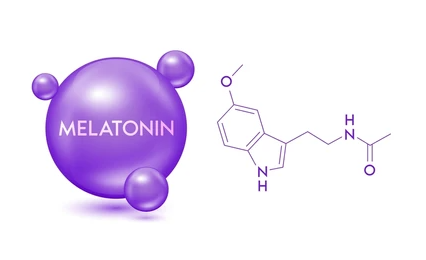
Melatonin
Melatonin (chemically N-acetyl-5-methoxytryptamine) is a hormone produced mainly by the pineal gland in your brain in response to darkness; it helps regulate your sleep-wake (“circadian”) cycle. Because of its molecular structure, it’s able to cross cell membranes and reach many tissues. It acts via specific receptors (MT₁, MT₂) to signal to your body that it’s time to wind down, lower body temperature, reduce alertness, and prepare for sleep. It also has antioxidant and anti-inflammatory properties: melatonin helps neutralize free radicals, supports antioxidant enzymes, and may protect cells from damage.





